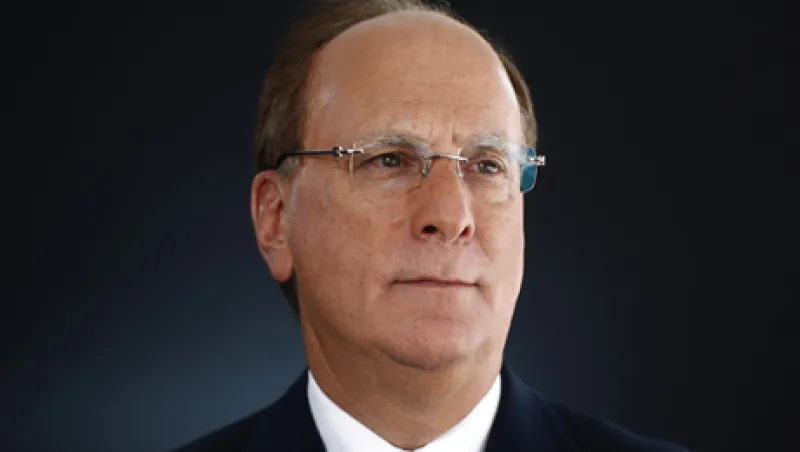When the United Nations General Assembly is in session, Larry Fink doesn’t get much alone time. World leaders and industry titans drop in on BlackRock’s offices in midtown Manhattan to get a word with the man at the top of $4.89 trillion in investments.
Though much of that money is tied up in passive vehicles, BlackRock is determined to make its voice heard in the boardroom. “We have to be louder as an industry,” co-founder, chair and CEO Fink tells Institutional Investor in the conference room outside his seventh-floor office during a gauntlet of back-to-back meetings with diplomats.
Over the past year Fink has emerged as a leading advocate of long-termism, a philosophy spreading among institutional investors and corporate chieftains that prizes value creation over shortsighted objectives like quarterly earnings.
BlackRock’s investment stewardship team — 22 professionals who engage with companies about environmental, social and governance (ESG) issues that the group deems risky over the long haul — has grown in importance at the firm, and Fink has recently given its leader, Michelle Edkins, free rein to expand with the aim of keeping an open dialogue with each of its portfolio companies year-round. “I’m a big believer in building this into an incredibly thoughtful organization,” says Fink, 63.
Armed with a BA in political science and MBA from the University of California, Los Angeles, the Van Nuys, California, native co-founded BlackRock in 1988 as a fixed-income manager under the umbrella of Blackstone Group. The firm spun out from Blackstone in 1995 and went public in 1999. A decade later it acquired San Francisco–based Barclays Global Investors for $13.5 billion to become the largest money manager on the planet.
With Barclays’ iShares exchange-traded funds now falling under his domain, Fink found himself presiding over a vast universe of stocks, and he had an epiphany: Some companies really suck. “An index is good companies and crummy companies,” he says. “Since we can’t sell those shares, we have only one power: the power of the vote.” BlackRock’s fiduciary duty, as he sees it, carries a moral obligation to steer companies in the best interests of shareholders.
A wealth of academic research supports Fink’s mantra that good corporate governance produces better returns in the long run. In 2003 the Nasdaq Stock Market and the New York Stock Exchange raised the bar on corporate governance standards for listed companies, including a rule that the majority of board members be independent directors and a number of provisions related to the oversight of auditing, compensation and director nomination processes. A forthcoming study of 1,982 companies across 15 industries in the Journal of Corporate Finance found that the gap in share prices between well-governed firms and peers that made changes to conform to the new rules tightened by 48 percent.
“We’ve reached a point where it’s up to market forces to intervene and shake up corporate governance at these firms,” says Jason Schloetzer, an associate professor of accounting at Georgetown University who co-authored the paper.
In Fink’s view, the stakes are high. In a low-to-negative-interest-rate world, pension funds and savers will be hard-pressed to meet their goals if corporations and governments don’t invest for long-term growth. Fink warns that the U.S. is headed for a crisis as an aging population’s needs for retirement outstrip what little savings have been squirreled away. “This is not a big issue in Washington because it’s not today’s problem,” he says.
Early this year, taking matters into his own hands, Fink wrote an open letter to the heads of U.S. and European corporations urging them to spell out their long-term growth plans. In July he and a star-studded list of fellow executives, including Warren Buffett and JPMorgan Chase & Co. boss Jamie Dimon, released a list of boardroom best practices they called Commonsense Principles of Corporate Governance.
Outside his official capacity at BlackRock, Fink collaborates with several industry groups — the Coalition for Inclusive Capitalism, the 30% Club and Focusing Capital on the Long Term — that are working to raise awareness of corporate social responsibility, which he regards as a key element of good governance. “If you bought a company and you fired 100,000 people but you maximized return, is that a good thing?” he asks. “I would say it’s horrible because the social costs are enormous.”
Any hint of fatigue from his grueling schedule fades when Fink, a staunch supporter of Democratic presidential candidate Hillary Clinton, starts talking politics and the environment. “See, I don’t have a plastic bottle,” he says, brandishing a stainless steel CamelBak vessel.
BlackRock, which manages $350 billion in ESG products, encourages clients to consider these options, but it’s come under fire from public interest groups for its holdings in oil and gun companies from tracking broad market indexes like the S&P 500. In August a group called Gays Against Guns staged a so-called die-in outside BlackRock’s headquarters to protest the firm’s stakes in gun makers Smith & Wesson Holding Corp. and Sturm, Ruger & Co.
Last month BlackRock released a report warning investors to weigh the impact of climate change on their portfolios, prompting a sharp rebuke from the Asset Owners Disclosure Project. The climate change lobby group accused the firm of “a disturbing hypocrisy” for voting against a proposal at Exxon Mobil Corp.’s annual general meeting in May that would have compelled the Irving, Texas–based oil and gas giant to divulge information about the impact of climate change regulations on its business. Although BlackRock cautions that corporations need to tackle climate risk in the long term, Fink says, “We’re not calling for it to happen tomorrow, and we’re not calling for it to destroy corporate value at some companies.”
Fink proudly admits that he often personally disagrees with the votes cast by Edkins and the investment stewardship team. “Our job is not to have Larry Fink’s social views,” he says, insisting that the team’s decisions reflect the best course of action for maximizing shareholder returns in the long run so clients can meet their pension liabilities.
BlackRock votes in line with management most of the time, but Fink insists that his firm is effecting change behind the scenes. When BlackRock has concerns with a company over ESG issues, the investment stewardship team — with backup from him in select cases — will talk privately with executives and directors and try to reach an agreement. A proxy vote against management is a last resort.
“We learned in the financial crisis that we need a voice,” Fink says. “We need a voice for long-termism.”
Get more on alternatives.






